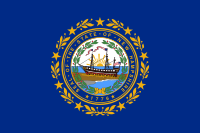The New Hampshire Portal New Hampshire (/ˈhæmpʃər/ HAMP-shər) is a state in the New England region of the Northeastern United States. It borders Massachusetts to the south, Vermont to the west, Maine and the Gulf of Maine to the east, and the Canadian province of Quebec to the north. Of the 50 U.S. states, New Hampshire is the eighth-smallest by land area and the tenth-least populous, with a population of 1,377,529 residents as of the 2020 census. Concord is the state capital and Manchester is the most populous city. New Hampshire's motto, "Live Free or Die", reflects its role in the American Revolutionary War; its nickname, "The Granite State", refers to its extensive granite formations and quarries. It is well known nationwide for holding the first primary (after the Iowa caucus) in the U.S. presidential election cycle, and for its resulting influence on American electoral politics. New Hampshire was inhabited for thousands of years by Algonquian-speaking peoples such as the Abenaki. Europeans arrived in the early 17th century, with the English establishing some of the earliest non-indigenous settlements. The Province of New Hampshire was established in 1629, named after the English county of Hampshire. Following mounting tensions between the British colonies and the crown during the 1760s, New Hampshire saw one of the earliest overt acts of rebellion, with the seizing of Fort William and Mary from the British in 1774. In January 1776, it became the first of the British North American colonies to establish an independent government and state constitution; six months later, it signed the United States Declaration of Independence and contributed troops, ships, and supplies in the war against Britain. In June 1788, it was the ninth state to ratify the U.S. Constitution, bringing that document into effect. Through the mid-19th century, New Hampshire was an active center of abolitionism, and fielded close to 32,000 Union soldiers during the U.S. Civil War. After the war, the state saw rapid industrialization and population growth, becoming a center of textile manufacturing, shoemaking, and papermaking; the Amoskeag Manufacturing Company in Manchester was at one time the largest cotton textile plant in the world. The Merrimack and Connecticut rivers were lined with industrial mills, most of which employed workers from Canada and Europe; French Canadians formed the most significant influx of immigrants, and today roughly a quarter of all New Hampshire residents have French American ancestry, second only to Maine. Reflecting a nationwide trend, New Hampshire's industrial sector declined after World War II. Since 1950, its economy diversified to include financial and professional services, real estate, education, transportation and high-tech, with manufacturing still higher than the national average. Beginning in the 1950s, its population surged as major highways connected it to Greater Boston and led to more commuter towns. New Hampshire is among the wealthiest and most-educated states. It is one of nine states without an income tax and has no taxes on sales, capital gains, or inheritance while relying heavily on local property taxes to fund education; consequently, its state tax burden is among the lowest in the country. It ranks among the top ten states in metrics such as governance, healthcare, socioeconomic opportunity, and fiscal stability. New Hampshire is one of the least religious states and known for its libertarian-leaning political culture; it was until recently a swing state in presidential elections. (Full article...) Entries here consist of Good and Featured articles, which meet a core set of high editorial standards.
WNHT was a television station broadcasting on channel 21 in Concord, New Hampshire, United States. Owned for most of its existence by The Flatley Company, the organization of real estate developer Thomas Flatley, it broadcast from 1984 to 1989, first as an independent station and in its final year as a CBS affiliate with a full news department. The station's failure to attract New Hampshire news and CBS viewers, combined with a weakening advertising market, led to its closure on March 31, 1989; the station would not be reactivated until 1995 when it reemerged as WNBU, a satellite of Boston's WABU. (Full article...) Selected article -Hanover is a town located along the Connecticut River in Grafton County, New Hampshire, United States. As of the 2020 census, its population was 11,870. The town is home to the Ivy League university Dartmouth College, the U.S. Army Corps of Engineers Cold Regions Research and Engineering Laboratory, and Hanover High School. The Appalachian Trail crosses the town, connecting with a number of trails and nature preserves. Most of the population resides in the Hanover census-designated place (CDP)—the main village of the town. Located at the junctions of New Hampshire routes 10, 10A, and 120, the Hanover CDP recorded a population of 9,078 people at the 2020 census. The town is part of the Lebanon–Claremont micropolitan area and also contains the smaller villages of Etna and Hanover Center. (Full article...) General images -The following are images from various New Hampshire-related articles on Wikipedia.
Did you know -
TopicsCategoriesNew articlesThis list was generated from these rules. Questions and feedback are always welcome! The search is being run daily with the most recent ~14 days of results. Note: Some articles may not be relevant to this project.
Rules | Match log | Results page (for watching) | Last updated: 2024-11-23 21:55 (UTC) Note: The list display can now be customized by each user. See List display personalization for details.
Related portalsWikiProjectsAssociated WikimediaThe following Wikimedia Foundation sister projects provide more on this subject:
Sources |



































